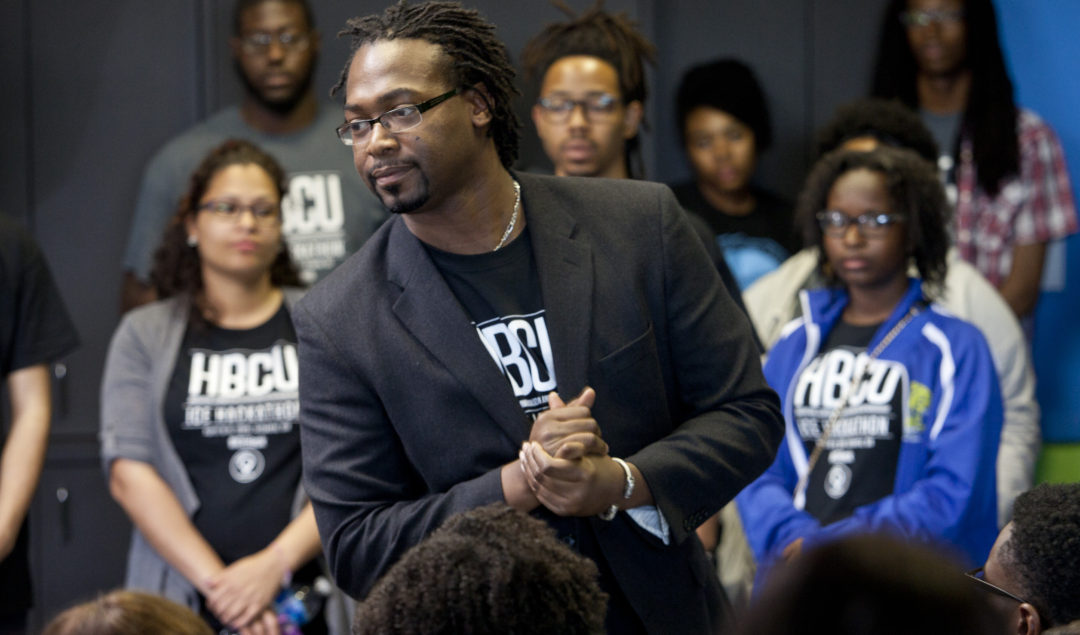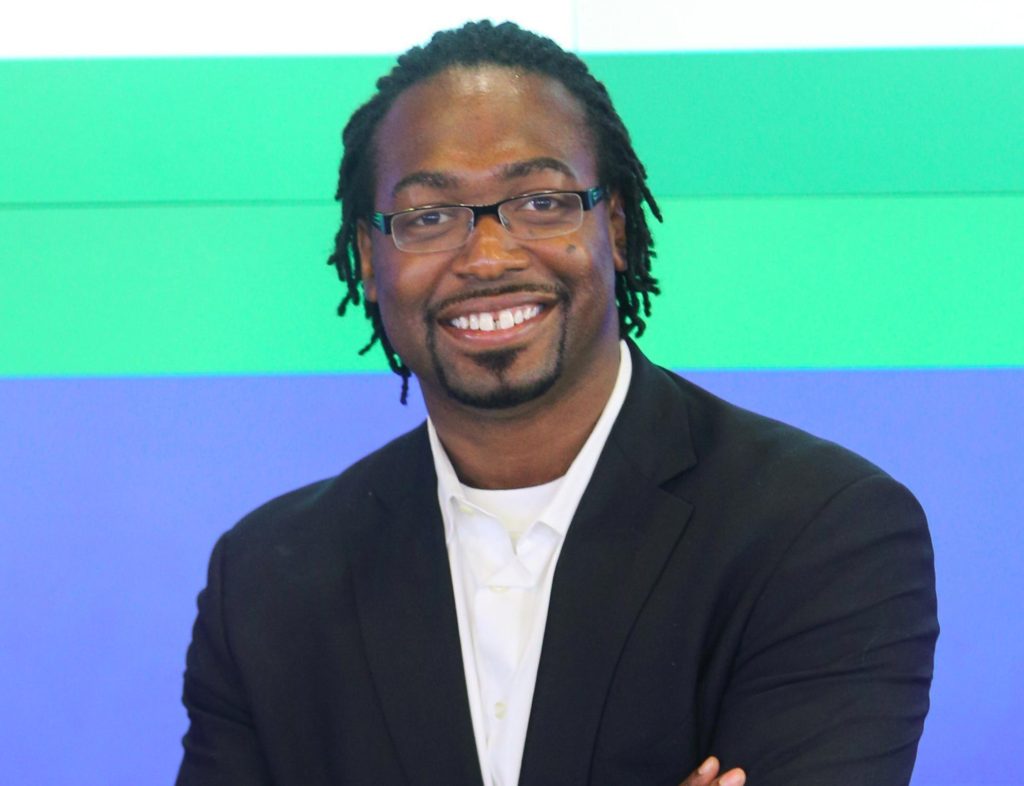Episode 65 – Kalimah Priforce

Kalimah Priforce is just a kid from Brooklyn committed to eliminating barriers to a child's greatest potential as the Headmaster CEO of Qeyno Labs. Qeyno became industry leader for the inclusive innovation ecosystem with Hackathon Academy, the first pop-up school model that prepares youth and their mentors to build web and mobile apps that accelerate college and career pathways in STEAM (Science, Technology, Engineering, Art Design, and Mathematics)
Tell us about yourself?
I grew up in the Brooklyn group home system from seven till I was fourteen. I knew I needed to get the hell out of that condition. I think all the kids felt that same way, but I think the difference between most of the other children and me was whether or not we felt like the world wanted us. And the feeling that the world wanted me was partly due to the books I was reading.
Even though I had speech problems I delved into books. It’s not just a matter of whether or not the world wanted us but whether we had it in ourselves to create our world. It even inspired me to have a hunger strike against my group home. That hunger strike lasted three days because I wanted more books in the library. By winning the hunger strike, it allowed us access to more books and some privileges to leave the group home and to go to the library and to the museum.
From there I was discovered by a community of Buddhist monks and nuns, and that community of Buddhist monastic gave me a private education on top of the poor education I was receiving from public schools.
How did you got separated from your biological parents and entered the group home?
My biological mother had borderline personality disorder, and so she was physically violent and emotionally violent, she tortured us.
Many time she would lock us in the basement of our apartment building. The basement of our apartment building reeked, and it was the basement of the entire building, it’s not a place where you would keep children. I figured out how the circuit breakers worked, and I was able to tamper with the circuit breaker so that it wouldn’t affect my biological mother’s apartment but affect everyone else apartment. I did that to the point where the entire apartment building noticed.
So, the neighbors came downstairs and saw me there; they were horrified. It was one of many events that led to social workers seizing us, [I testified against her in Court about the abuse].
What inspired me to stand up to her finally was a movie called “Flowers In An Attic,” and the movie is about this abuse that these children receive from their grandmother. The final scene in a movie where the kids walk out, and then they struck out on their own. This whole idea that you can choose to walk away was very powerful for me. That scene just kept rolling in my head, and so when my biological mother was trying to convince me not to testify against her in Court, it inspired me to walk away and tell the truth.
Tell us about the Monastery?
I have very fond memories of them. They provided me were discipline and internal control. They gave me, not necessarily a nurturing environment but a structured one. Up till then, I lived in chaos. I went to school, and school replicated the street, the schools were chaotic. [At the monastery] From how we all ate together, to how we greeted one another, everything was structured.
I think the first person who inspired me was Dr. Lorraine Monroe. None of the schools accepted me because of my behavior record. The Academy in Harlem was a preparatory high school, they took me because they only received my academic background, they hadn’t received my behavioral background.
Dr. Monroe asked me for an explanation as to why I seemed like I was two different kinds of kid. My behavioral was one kind of kid and academically I was another kind. And her saying was that somewhere in between those two children is the truth, somewhere in between those two children is the miracle of what education can do, and so that’s what she did.
She asked me questions, and I still kept my sort of fluid persona until finally, I revealed the fact that yes, I did learn Chinese, Mandarin calligraphy, and that I did learn Philosophy, and I was able to talk very differently than how I was speaking to everyone else. And after she stopped laughing, she decided to give me a second chance. I was re-enrolled back into the school after being expelled, and she changed all my classes, she even assigned me, new friends; she said, these are your friends now [to this day, they are still friends of mine].
Sometimes I would sit and wait for her, while I was waiting for her, I would watch her interact with very influential people, wealthy people as she was selling them the concept of her school, what she was trying to do for her school, and of course administration, teachers, she would interact with them, and I watched her. In many ways she was my model, what leadership looked like, and what being an educator was, and that stuck with me, even though for a while I did not want to become a teacher.
I want to know about your entrepreneurial efforts, starting with your computer company when you were sixteen.
I already became a hacker when I was around twelve at Junior High School. I always had a love for technology; I had a knack for it. And when I built my first computer, I realized that I could do this for other people, and that’s when I started with Whiz Kidd computer services.
What do you think about the small numbers of people of color in tech?
When I talk to Oakland officials, a lot of these tech companies are thinking about moving to Oakland or branch out in Oakland; they’re asking for things, whether it’s tax breaks, etc. They want a whole lot, and for them to have the arrogance that the community could ask something of them in return, it’s indicative of the culture at its most senior levels.
Those individuals are the ones who create the culture of the company. So, that diversity officer who’s at this tech giant company, they have to pitch to those people regularly, about why it is important for that company to use any money, or any dollars, or any of their resources, to create a more equitable tech eco-system.
What happens is that a lot of these companies don’t move until Jesse Jackson is at their door, they don’t move until Van Jones said something on TV, they don’t move unless an employee of color of creates a racial discrimination suit. If your option as the tech company is to do two things, one, respond during a crisis, and two, to be silent until that crisis appears, it shows me what your values are. It shows me the values of your founders, CEO, and Board.
I had a recent meeting, Jesse Jackson gathered a whole bunch of black individuals in Silicon Valley, and for two hours people talked, and I listened. They talked about more access to capital and how there needed to be more African American executives. I finally raised my hand and said, ‘We’ve been talking for a while, and no one has mentioned kids.’ What the fact remains is that no matter what we do on top, Mark Zuckerberg didn’t go to a school where there were metal detectors. How do we expect to create the next Mark Zuckerberg in communities around the country when the schools can’t keep up. Everyone nodded their head, and then they went back to their conversation about adults. However now people are getting more into kids, and STEM access.
When I look at it from a historical perspective, when I see the black professional organizations that are formed within large enterprises, that wealth doesn’t return to the black community, that money doesn’t circulate, it stays there. If anything, they create a class distinction, through their events, how they socialize, they want to be the elite, and it’s cute for them. I’m not interested because the problem that I’m trying to solve is that my brother isn’t alive and is not the computer scientist that he said he wanted to be.
I think about that, I think about am I going to entrust the future of the Qeyno’s of the world, [that’s my brother or me], to these black professional groups who really just want to send their kids to the best colleges, the best camp, and focus on their own. It is a class distinction; they don’t care about these kids.
Eventually, they would like to do some community work and that sort of thing, but nothing structural happens because that require a level of activism, and for them, it would threaten the safety and security of their jobs.
Is a change going to happen by those who work for a lot of these big companies? I don’t think so. I believe that they can support change but the actual change makers are those who are actually spending all of their time, energy, and resources. I always recall how progressive a lot of my friends are before they join these tech giant companies, and it always happens, I hear less about their activism, and I see more pictures of their vacation. It always happens, no matter how radical that person is, he left activism, and that is what our current structure of capitalism does. I would rather stay committed to being a change maker, and that is something I’ve given my life to.
America looks unique to a group home kid; you are confined to this building, you’re getting supper and food, you’re isolated, you have no prospect of a future.
The one thing that I believe that America can always do better [and every world nation can do better] is loving their kids. What we can do is to create ‘opportunity’ for our children. Opportunity to know the language of the 21st century which is code and prepare them to become a part of the technology community. That’s the best love that we can ever give to our kids.




